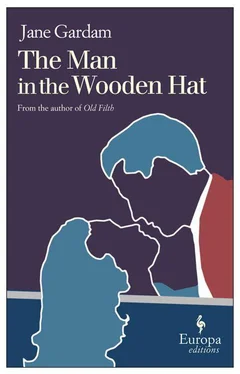“About three hours ago.”
“Is he weighing up your acceptance? Considering your sentence? I can see that you are.”
She stood up. “You are as vulgar as they say you are.” She handed him her empty plate, crumpling his son’s dinner napkin on top of it as if he were a waiter, and walked away.
She had been right about dinner. A junior in his team had asked Edward for a consultation after the party. It might make a vital difference to the Case. Edward would of course walk her back to her hotel first.
“Will we meet later?”
“I never know how long—”
“Edward, we’ve not been engaged for a day yet. Can’t you even stop for some dinner? I didn’t see you eating anything. We’ve said so little—”
“Not hungry. My clock’s not settled yet, it’s the middle of the night, I think.” He took her arm above the elbow and said, “Anyway, I’m too excited.”
“Oh! Oh, well. Eddie, come to my room afterwards. At the Old C. It’s number 182. I’ll be alone. Lizzie’s out.”
“Rather not promise. The end of the week will be ours for two full days. Then we have all the years we’re going to live.”
He dropped her outside her hotel, which was pulsing with lights and screeching music.
“Well, goodnight, my future husband who doesn’t ever kiss me.”
“Well, certainly not here. You know I love you. I always will. Thank you. Please live for ever. Stop me from being a bloody bore. I can’t help working. It’s been a safety valve since school. Device for not thinking. But I’ll be all right now. Always. We’ll have a long, long honeymoon when this Case is out of the way.”
He kissed her like a brother.
Her room was unlocked and she had to turn out four uniformed room-boys who were lying on the floor and on the beds watching her tiny flickering black-and-white television. Lizzie must have turned the Room Free label the wrong way round instead of to Do Not Disturb . Lizzie’s reading of Cantonese was getting hazy. There was a musky smell in the room and Elisabeth opened the window, turned off the television and the lights and the air-conditioning. Warm harbour smells floated in. The water pipes along the walls clanked to the rhythm of somebody’s shower above. She took off the pearls and put them on a chair. She picked up the yellowing finger-marked breakfast menu and then thought, no, she’d order in the morning. She only needed sleep.
About midnight she woke in panic. The sky above was throbbing with planes. The boy Harry would be at the airport now. No, he’d already be in the air, sitting in his first-class seat. “Flying out at midnight.” To be hoped that the mother. . The mother had looked drunk. You’d think the father would have cancelled that Con. An only child. Will Edward cancel a Consultation for a child? She decided, no. But there will be me.
Our children will always have me.
Where’s Lizzie? Secret life. Always had. All these secrets. She thought of the codes at Bletchley Park in the mild English countryside. We took it so lightly. Secrets. Elisabeth slept now against the madhouse clamour of Kowloon. Blank. Jet lag. Still partly in Sydney. Hole in the air, c’est moi . Ought to be better at all this. Calmer. I am getting married. I’m twenty-eight.
In a dream she was informing her long-dead and always shadowy parents not to worry. She was back on the blistered floor of the Camp. The dust. Her father’s voice suddenly boomed out at her, “There’ll be money when you’re thirty. Do nothing hasty.” His ribcage had stuck out. His nose sharp in the skull. “I’m quite safe,” she shouted. “I’m doing all right.”
In the morning she woke to Lizzie’s radio playing beside the other bed and sat up bleary and tousled blinking across to where Lizzie lay prone. The radio rattled on in Cantonese.
“Lizzie-Izz! You’re back! Where were you? I’ve something. .”
“Shut up a minute. There’s terrible news.”
“Oh. What news?”
“Plane crash. Early this morning. Over the Indian Ocean. It broke in two.”
Elisabeth was out of bed and dressing, “Which?”
“Which what?”
“Plane. Airline. Going where?”
“British Airways, to Heathrow. The new design. A lot of children flying home to boarding school. What are you doing?”
Elisabeth was in her clothes. She did not do her hair or wash or look in the glass. She felt for her sandals by the bed, ran into the bathroom, ran out again, pulling up her knickers. She left the rope of pearls lying on the chair. She did not look for her purse. She ran from the room.
“I think actually they said it happened after it had left Rome,” Lizzie called, but Elisabeth was out of hearing.
Elisabeth ran into the street, on to the quay, ran across the roads in the drumming relentless Monday morning crowds that marched to work in their thousands, not looking at her, not speaking, not touching, not stumbling, and nor did she. She ran up the marble steps of the Peninsular Hotel and the bellhop boys in their white uniforms and pillbox hats pulled back the glass doors and blinked as she passed by.
Beside the fountain she stopped. The white piano on the dais was covered with a cloth and the gold music stands were folded up. She ran to the lifts and eyes turned from her in embarrassment, two immaculate men at the reception desk looking pointedly away. Somewhere above her in the hotel Edward would be getting up, thinking of the coming day in Court. It never occurred to her to ask for him.
She didn’t know the number of the Veneerings’ rooms and asked the lift boy who said “Suite Number One” but looked uncertain about taking her there. “It’s urgent,” she said. “It’s about a legal Case in the Courts.” He looked at her wild hair and crumpled dress.
But the lift rolled up, the gates slid open and she was running towards the double doors of Suite Number One and ringing the bell. She rang and rang.
The door at last was opened by a maid — no, by a nanny. One of the old amahs in black and white, her face gaunt. Behind stood Terry Veneering. And beside him stood Harry.
“We missed the plane,” the boy shouted. “I’m still here. Mum passed out and we missed it. And one just like it crashed in the Med.” He flung himself on Elisabeth.
The amah vanished and Veneering said, “Harry — quick. Go and tell them, Miss Macintosh needs some coffee. Go on. Go on.”
Then he stepped forward and took her hands and led her inside.
“No, no, I won’t come in,” she said. “It’s all right now. I don’t need to come in.”
His clownish face of the night before looked thin and white, his blue eyes exhausted. His hands holding hers shook. “I thought so, too,” he said. “But it wasn’t his.”
“Must go back,” she said. “Find Edward. Tell friend. Isobel. All right now. I’m all right now.”
“Stop crying.”
“I must be mad,” she said.
“I’ll send a car for you tonight. Your hotel the Old C? I’ll send a car at six-thirty. Look. Stop. He’s all right. It wasn’t his flight. Sing Te Deum and Laudamus . Elisabeth, it was a different plane .”
“Yes. Yes, I will sing — I’ll sing for ever.”
“You met him — shut up or I’ll shake you — you met him for about half an hour. He’s mine, you know, not yours. Soon you’ll have your own.”
“Yes. I can’t understand. It must be hysteria. I’m never, never — Oh, but thank God. Thank God, Terry!”
“Six-thirty,” he said, shutting the door on her.
She went out. She did not telephone Edward or wait for him to ring her, or explain anything to Lizzie who had again vanished. She went to a small, expensive shop and with the end of her money, labelled “emergencies,” she bought a dress.
Читать дальше












